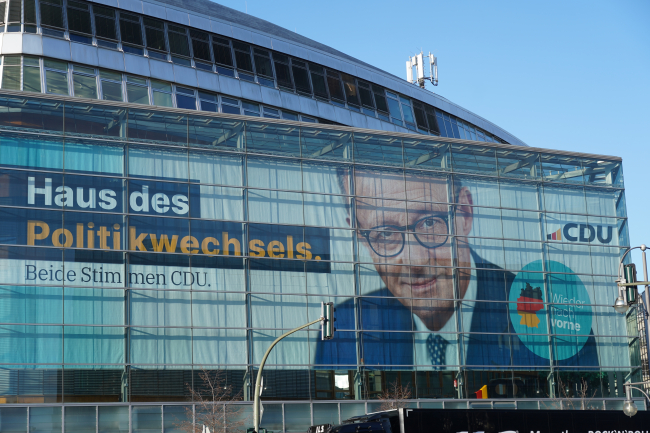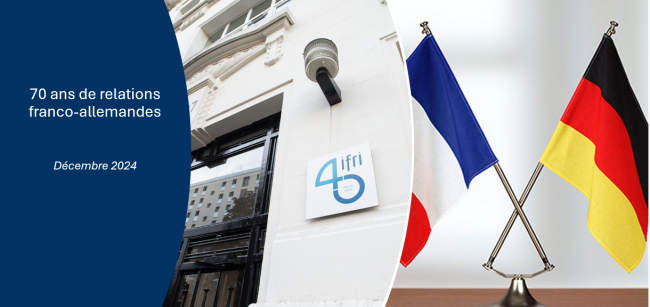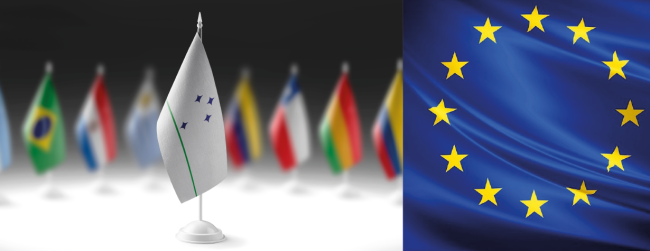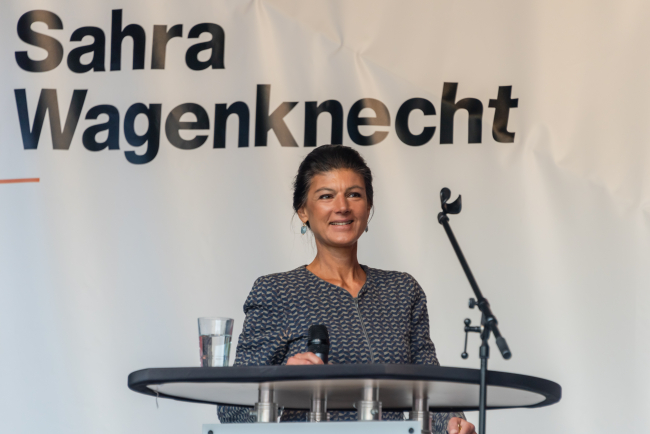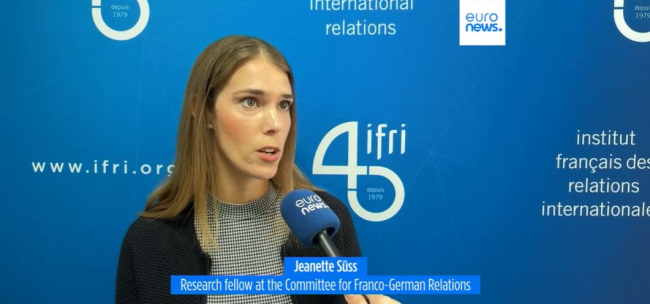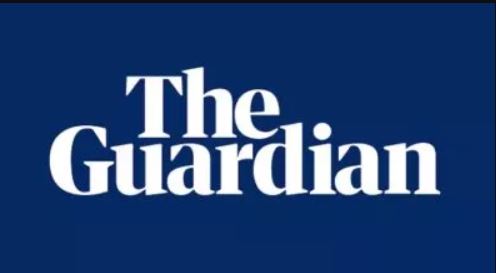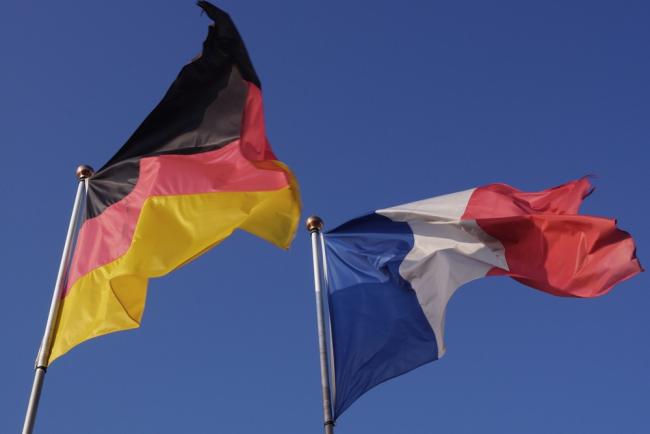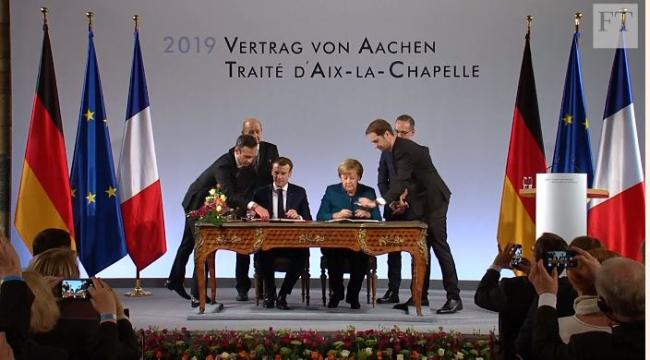Germany
An in-depth analysis of Germany's trajectory through its foreign and European policies, its relations with France, its economy and its domestic politics, offering a perspective on the country and its role in the world.
Related Subjects

Germany in the Electoral Campaign to the Early Elections on February 23 - The Challenges of a high-risk Voting
One month before the early Federal Elections in Germany, which will take place on February 23, 2025, after the "Traffic light coalition" imploded on November 6, 2024, the political landscape in Germany appears to be relatively stable despite the rise of the far-right Alternative for Germany (AfD).
70th Anniversary of the Study Committee on Franco-German Relations (Cerfa). Genesis, History and Visions for Franco-German relations
The Study Committee on Franco-German Relations (Cerfa) was created in 1954 by an inter-governmental agreement between the Federal Republic of Germany and France, in order to raise awareness of Germany in France and analyze Franco-German relations, including in their European and international dimensions.
NATO: 75 Years of Strategic Solidarity (replay)
The war in Ukraine, burden-sharing between Allies, U.S. disengagement from Europe, new areas of conflict... At a time when the Alliance has just celebrated its 75th anniversary and the Stoltenberg era is drawing to a close after ten years at the head of the organization, NATO's agenda bears witness to the diversity of its areas of action, as well as to the different perceptions of the Allies on these issues.
In the wake of the Washington summit, this conference of diplomats, military officers and researchers aims to analyze the short- and medium-term prospects for the Atlantic Alliance.
State Elections in Thuringia, Saxony and Brandenburg - Extreme Parties on the Rise?
The Alternative for Germany (AfD) became Germany's strongest political force in the regional elections in Thuringia and Saxony.
Between „Strategic Autonomy” and „Zeitenwende”: The Importance of Trade Between The EU and Mercosur
This policy paper analyses the geopolitical and economic significance of the EU-Mercosur agreement for the European Union (EU) in the context of the EU’s new European Economic Security Strategy.
Neither Left nor Right, but Both? The Sahra Wagenknecht Alliance (BSW) in the Wake of European Elections
The 2024 European elections not only provided the occasion for a new German party, the “Bündnis Sahra Wagenknecht” (BSW), to emerge but also to obtain 6.2% of the vote.

Germany and France agree Ukraine may strike Russian Military Targets
German Chancellor Olaf Scholz said Germany would not prohibit Ukrainian attacks on Russian military targets, saying Ukraine "is allowed to defend itself."


Franco-German relation faces familiar challenge ahead of Macron’s Germany trip
Franco-German symbolism, rather than bickering over policy, will briefly take centre stage when French President Emmanuel Macron meets German President Frank-Walter Steinmeier in Berlin on Sunday (26 May) during a three-day state visit, the first in 24 years.
'Depth of Franco-German bond': Macron to meet German president in rare state visit
French President Emmanuel Macron will visit his German counterpart Frank-Walter Steinmeier in Berlin on Sunday in what is seen as the highest level of diplomatic courtesy gestures.
German Ports and China: How to Reconcile Openness, Resilience and Security?
Germany is dependent on its ports for the smooth running of its open economic model and has benefited from globalization in recent decades when the internationalization of its value chains strengthened its competitiveness. Yet, with today’s hardening geopolitics, the vulnerabilities of Europe’s leading economic power are becoming apparent.
Between „Strategic Autonomy” and „Zeitenwende”: The Importance of Trade Between The EU and Mercosur
This policy paper analyses the geopolitical and economic significance of the EU-Mercosur agreement for the European Union (EU) in the context of the EU’s new European Economic Security Strategy.
Zeitenwende: The Bundeswehr’s Paradigm Shift
Russia’s invasion of Ukraine on February 24, 2022, marked a turning point in German defense policy. After thirty years of military downsizing, the Bundeswehr found itself at an extremely low capability level just as a high-intensity war involving a great power was breaking out on Europe’s doorstep for the first time since 1945. Chancellor Olaf Scholz’s response was to embrace this “turning point” (Zeitenwende) by launching a major program to reequip Germany’s armed forces.

DOSSIER - 60th anniversary of the Elysée Treaty (1963) and implementation of the Treaty of Aachen (2019): where do Franco-German relations stand?
On January 23, 2023, France and Germany celebrated the 60th anniversary of the Élysée Treaty. This is an opportunity for us to analyze the state of relations between the two countries, and the contribution made by the Treaty of Aachen, which was added in 2019.
Attention to the Periphery? Germany and the Pacific Island States
In September 2020, Germany adopted policy guidelines for the Indo-Pacific that comprehensively set out its approach towards this increasingly important region, seeking to diversify partnerships beyond China.

French Foreign Policy in the Age of Polycrisis
Under the presidency of Emmanuel Macron, France has set itself the goal of strengthening its international presence, being more proactive and defining the European reform agenda. However, the French room for manoeuver is limited.
Germany and the Eastern Partnership after the Ukraine Crisis
The conflict in and about Ukraine has catapulted the European Union's Eastern Partnership (EaP) into the limelight of international attention. Belittled as a bureaucratic and technical policy instrument, the European Neighbourhood Policy and the EaP as its Eastern regional dimension have within the course of a few months gained unexpected geopolitical significance.
Deploying the Bundeswehr: more transparency, more flexibility, but Parliament’s consent remains key - The Rühe Commission’s final report
Besides the often invoked historical dimension behind Germany’s strategic culture of restraint, there are today very tangible legal reasons that prevent assertive German military interventionism (which are, of course, directly linked to the historical dimension): any intervention of the German armed forces requires the Bundestag’s consent.

Germany's Unnecessary Hegemony
Based on the realist theory of international relations, this article analyses whether Germany has any incentives to seek (regional) hegemony. It concludes that under the current systemic circumstances – in which the country's survival is ensured by the United States – Germany has no reason to become a hegemon, which is normally a strategy to escape the perils of the anarchic international system.
German Defence Policy in 2014 and beyond: Options for Change
The speeches made by several German leaders at the Munich Security Conference in early 2014, emphasized that Germany needs to be ready for greater international commitment, and without a priori excluding military instruments.
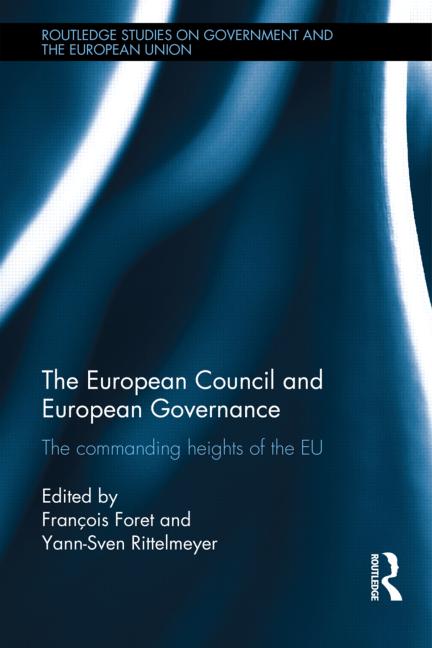
The European Council and European Governance. The commanding heights of the EU
French-German friendship ‘still alive’ as Macron meets Scholz amid tensions
Two leaders under pressure to repair relations after rifts over defence, energy and China. The French president, Emmanuel Macron, hosted the German chancellor, Olaf Scholz, for lunch on Wednesday as they sought to iron out significant differences on energy and defence that have weakened their relationship at a time of war in Ukraine.
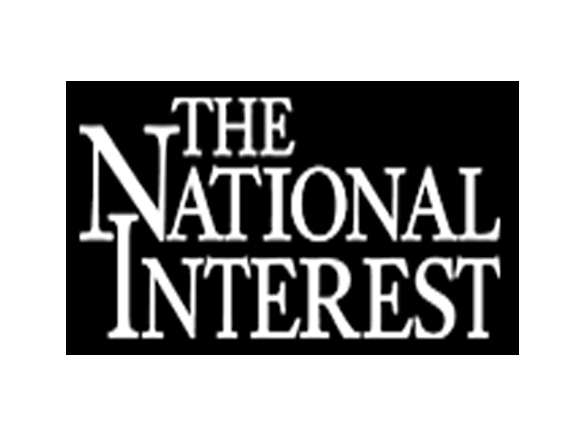

An Engine Replacement Could Kill Europe’s Huge F-35 Plans
If the decision to replace the engine for the F-35A is implemented, countries flying F-35s will find themselves forced into unforeseen and overly complicated supply chains.


Cyprus, to be remade, must resolve some issues
Cyprus is set to be ‘remade’ in the coming years through €1 billion in grants from the European Recovery Plan, as we’ve reported here, but there are a few issues to be resolved along the way, according to EU policy experts and economists.
[...]

Can Huawei Face EU Fines Like Google and Apple?
The European Union’s chief antitrust official, Margrethe Vestager, has made her name tackling big corporate fish in pretty unconventional ways. A ruling on Alphabet Inc.’s Google, which came with a seven-figure fine, argued free services weren’t always good for the consumer, while those on Apple Inc. and Starbucks Corp. deemed that low taxes were illegal state aid (though some judges begged to differ).
Merkel and Macron betray weakness with cautious Aachen treaty
When Angela Merkel and Emmanuel Macron sign a new Franco-German treaty in the historic city of Aachen on Tuesday, there will be much soaring rhetoric about the deepening ties between the two countries. To critics, though, the Treaty of Aachen is thin gruel. Anyone hoping for a new, tighter alliance between France and Germany, and for signs that the two countries might once again drive European integration, will be disappointed.
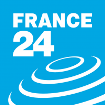

100 years after independence from Moscow, Finland anchored firmly to West
HELSINKI (AFP) - A century after gaining independence from its powerful neighbour Russia, Finland continues to consolidate its ties to the West, as tensions flare between Moscow and the West. Russia's 2014 annexation of Crimea and an uptick in military activity in the Baltic region have tested Finnish-Russian relations, painstakingly maintained over the years with scrupulous diplomatic efforts.


Sweden brings back military conscription amid Baltic tensions
The Swedish government has decided to reintroduce military conscription - a move backed by the country's MPs. Why is this happening? And how will it work? How does it impact regional security? And which other European countries have conscription?


An Architect of the Latest Greek Bailout Navigates Germany’s Dual Roles
When the German Parliament set aside its objections and voted on Wednesday to approve a bailout for Greece, the chief proponent was both an architect of the deal and one of those raising fundamental questions about it: Germany’s finance minister, Wolfgang Schäuble.
Support independent French research
Ifri, a foundation recognized as being of public utility, relies largely on private donors – companies and individuals – to guarantee its sustainability and intellectual independence. Through their funding, donors help maintain the Institute's position among the world's leading think tanks. By benefiting from an internationally recognized network and expertise, donors refine their understanding of geopolitical risk and its consequences on global politics and the economy. In 2024, Ifri will support more than 70 French and foreign companies and organizations.










